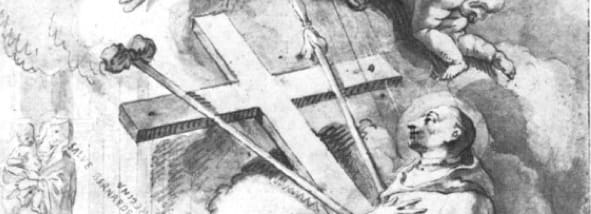Is it possible to pray out of misery without falling into self-pity?
The question, posed by one of our readers, indicates a grave evil confronted in prayer. Misery is the demeaning absence of God’s love, a love we have rejected. Without the love God created us to know, we are restless and in our restlessness we are inclined to mistake our own bloated egos for God. The gravity of such self-occupation is a perilous trap, a pit of escapist fantasies, rash judgments, bitter resentments, self-loathing — not to mention self-pity on top of it all. Blown this way and that by these out of control storms raging in our hearts, enslaved to selfish irrationality, we are locked into a conversation with our own tormented thoughts. Only the saving Truth sent by the Father can liberate us from this psychological hell.
 Christian prayer conceives humility. Against the illusion of self-sufficiency we love to entertain, when we realize the dangerous peril we are in without God’s love, a humble cry of the heart begins to take shape. We feel the need to call out to the Lord because, on some level, we realize that without God’s love we cannot deal with ourselves. It is only by the humility Christ crucified gives us in our misery that we begin to shake the shackles of self-pity imprisoning our prayer. The great saints and mystics offer us powerful insights into the humility of prayer. In particular, on this point, we can turn to Saint Bernard of Clairvaux and his treatise on Humility and Pride.
Christian prayer conceives humility. Against the illusion of self-sufficiency we love to entertain, when we realize the dangerous peril we are in without God’s love, a humble cry of the heart begins to take shape. We feel the need to call out to the Lord because, on some level, we realize that without God’s love we cannot deal with ourselves. It is only by the humility Christ crucified gives us in our misery that we begin to shake the shackles of self-pity imprisoning our prayer. The great saints and mystics offer us powerful insights into the humility of prayer. In particular, on this point, we can turn to Saint Bernard of Clairvaux and his treatise on Humility and Pride.
Before he explores the regress into pride against which Christians must struggle, Saint Bernard offers a meditation on the Ladder of Humility we find in the Rule of Saint Benedict. To understand this meditation, it is helpful to remember that the word “humility” derives from “humus” which means fertile soil. This kind of soil is tilled and made vulnerable to the seeds God scatters, vulnerable to a new fruitfulness. Humility implies the patient suffering of one’s own brokenness laid bear by overwhelming trials. It is the way of our Crucified Master who humbled Himself unto death. Behind Saint Bernard’s treatment of humility and pride is a word of hope: when we raise ourselves up by love informed faith, the difficult truths we need to accept about ourselves do not pose an obstacle to deeper intimacy with Christ, but instead offer us opportunities to draw close to Him who abides in the heights of humility.
Whereas we tend to think of humility as a kind of weakness, Saint Bernard surprises us by describing the virtue as a height into which we ascend and from which alone we can see what is true. We do not become humble all at once but only as we accept the truth about ourselves to a greater and greater degree, like ascending a ladder. The more we accept the truth about ourselves, the more vulnerable to the love of the Lord we become. In Saint Bernard’s thought, the apex of Truth and Love coincide in the Savior. Eternal Truth leans over the top of this ladder of humility, reaching out to us and gazing on us in love. Pulled up by grace, rung by rung, our afflicted humanity is carried to the heights of humility as we progress into the Christ’s gaze of love.
To make sure we understand that this progress is not by way of our own self-reliant psychological feats, Saint Bernard explains that this ascent into the gaze of the Lord is made by way of ecstasy. Although today we are inclined to think of ecstasy as a sublime but esoteric experience, Saint Bernard has in mind a different understanding of this term. In the Fathers of the Church, ecstasy is a going out from self in which I leave behind the old ground on which I rooted my existence (from the Greek: ek stasis, or in Latin: excessus). Christian prayer actually sees the truth about personal misery only because it gains the vantage point of Risen Lord’s loving gaze, and this by sheer grace. As St. Bernard explains, “What is meant by this ecstasy” It is that state in which [the Christian] is carried away from himself and clings to the truth and is able to judge himself (1 Cor. 11:31).” (On Humility and Pride, V.16)
This new realization of the love of the Lord is a surprising opportunity for repentance and conversion, an unexpected moment of renouncing of self and following of Him, an unmerited gift that confronts our attachments to both self-pity and self-loathing. Beholding the One whom we have pierced, the One who reveals to us the love of the Father, this evokes a change of heart, the surrender of all kinds of rash judgments to which we have bound ourselves, a pierced sobriety of thought, a new compassion that does not allow us to comfortably indulge the regurgitated bitterness we have towards others or ourselves. Following the humility of Jesus Crucified means we die to our old self-centered way of thinking and living so that we can be raised up in the Risen Lord’s life and thought.
The pattern Saint Bernard sets in the first steps of this ladder sets the tone for the whole journey of humility. Even more, it opens up a beautiful and difficult mystery that lives in Christian prayer. It is a pattern from selfish self-centeredness to compassion and empathy for the plight of others. It is a pilgrimage out of a psychological hell and into the peace of Christ.
In the first step of humility we realize how much we need the Lord in the face of our own misery, our own false judgments. If we do not humbly suffer the truth about the lack of love that lives in our hidden judgments and feelings, we do not realize how much we need to look to Christ to save us. If ecstasy is a gift of grace, we do not know we need to ask for it until we realize the peril we are in. As the Lord shows us our sinfulness, He does so not so that we will beat ourselves up for things we cannot change, but only that we might accept responsibility for what we have done and humbly ask His forgiveness and the forgiveness of those we have hurt.
This first step of repentance from sin stings, but the second step of humility involves even more painful realization: we are all unreliable liars. Bernard explains it is with great compassion and mercy that we realize “All men are liars” (Psalm 116:11). Until we progress in humility, we do not realize how demeaning and destructive our unfaithfulness to each other is. In this step, without anger or accusation, we become aware that the same misery that entraps us is also entrapping everyone we know in an unbearable plight. Together with this realization, there is also a thought of hope that sustains us as we keep our eyes fixed on the One who gazes on us in love: although we are all prisoners of a common misery, Christ Jesus truly is our salvation. His love is sufficient not only for me but also for my brothers and sisters who struggle along with me.
Mercy comes from misericordia — it means to have one’s heart pierced by the suffering of another, so pierced that there is no way to be indifferent to it. Mercy suffers the misery of one’s neighbor because it sees the neighbor’s dignity. Mercy is love that goes out to implicate itself in the plight of another so that one’s brother or sister does not have to suffer alone. It weeps over the misery of humanity because there are some things so heart-breaking that, once we see them, not to weep would be callous. Such tears are the food of prayer — because they are the tears God shares with us. What an suffering ecstasy this is — the ecstasy of the Cross! With ever deeper humility, we progress from an awareness of our own sin to an awareness of how much the world needs salvation.
How do we pray out of misery? How do we confront our own self-pity? Even in the very first moment of progress into the humility of Christ, we move from offering the Lord our own brokenness to offering God the brokenness of the whole world. As part of this graced-suffering ecstasy, Christian prayer implicates us in the plight of our brothers and sisters even as it implicates us more and more in the love Christ. The Lamb of God is the focus of Christian prayer, the living Mystery that comes to us in the form of a gift, a heart-stinging gift that can only be welcomed with faith and love. By simply submitting our tormented thoughts to the Lord and trusting in Him who gazes on us in love, we learn compassion and come to understand the pain that lives in the hearts of those we love. Even when they have hurt us gravely and (even more) when we have hurt them, even as we are tempted in all kinds of ways to hang on to and even entertain thoughts not worthy of prayer, we discover the gift of intercession, that prayer that cries out for mercy the cry that Mercy Himself does not fail to hear.
+
Art for this post on praying in humility and mercy: Design for an altarpiece at Birnau depicting St. Bernard of Clairvaux, Gottfried Bernhard Göz, 1749, PD-US author’s life plus 100 years or less, Wikimedia Commons.




